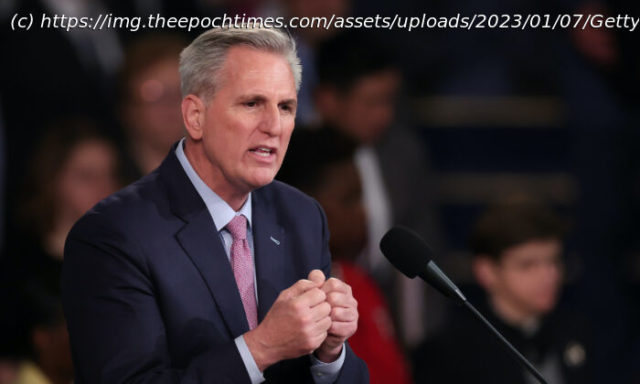Array
Newly elected House Speaker Kevin McCarthy (R-Calif.) had to make numerous concessions to win over a holdout group of populist Republicans in order to secure their votes. Here are the key concessions McCarthy had to make, including what some Republican strategists say is the key one—allowing just one member to move to vacate the speaker’s chair, giving McCarthy a fragile grip on power.
McCarthy was elected as the 55th House Speaker in the early hours of Jan. 7 by a vote of 216–212.
While it normally takes 218 votes—a majority of the House—to become speaker, that threshold can be reduced if members are absent or merely vote present.
It’s precisely this maneuver that gave McCarthy his coveted win, as six Republicans voted “present” instead of “yea” in the final vote: Reps. Andy Biggs (R-Ariz.), Lauren Boebert (R-Colo.), Eli Crane (R-Ariz.), Matt Gaetz (R-Fla.), Bob Good (R-Va.), and Matt Rosendale (R-Mont.).
In a 20-minute speech following the vote, McCarthy laid out his priorities for the 118th Congress, including securing the southern border, combating “woke” indoctrination in American schools, and unleashing domestic energy production.
“We must get America back on track,” he said. “We’ll hold the swamp accountable.”
The House now plans to vote on a hefty rules package, which includes a series of concessions that the 20 holdout Republicans pushed for.
Some GOP strategists hailed the rule changes as a major win for the House Republicans Conference—the party caucus for Republicans in the House of Representatives—saying it marks the first time in decades that they have independent authority from leadership.Key Concession
McCarthy’s road to the gavel was rocky, involving 14 rounds of failed votes before the 15th round brought victory. In order to secure the support of the holdout Republicans, McCarthy had to offer a series of concessions.
Republican strategists say the key concession is found in subsection “q” of the new House rules package (pdf). It reinstates a centuries-old rule allowing just one member to move to vacate the speaker’s position.
Such a motion would be made via a so-called “privileged resolution,” which supersedes all other business except adjournment.
“Anyone, anywhere, any time,” Rep. Matt Gaetz (R-Fla.) said on Thursday on Capitol Hill, commenting about the power this concession grants to members to try and oust their speaker in a vote of no confidence.
Were this motion to be invoked, McCarthy would need a majority of 218 votes to remain as House speaker.
“This effectively neuters McCarthy,” attorney Jenna Ellis, who represented the 2020 Trump campaign, said in a post on Twitter.
“The original 20 have a pact that if McCarthy does anything outside his promises, they will vote to not retain and he’s gone,” referring to the 20 holdout Republicans who were opposed to McCarthy as speaker.






